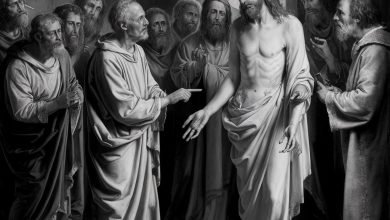
Who is Deborah and what is her role in the Bible?
Who is Deborah? Deborah is one of the prominent and influential women in the Bible. She was known as a judge and prophetess, believed to have the ability to hear God’s voice and convey His messages to others. Although Deborah, as a priestess, did not offer sacrifices like men, she led religious ceremonies and preached.
Deborah is one of the prominent and influential women in the Bible, known primarily as a prophetess and judge in the land of Israel. Her story can mainly be found in the Book of Judges, especially in chapters 4 and 5. Many biblical scholars believe that Deborah also had a spouse. However, in Hebrew, the same word is used for “woman” and “wife,” so it is uncertain whether Deborah was “the woman of Lapidoth” (a place) or “the wife of Lapidoth” (a person).
فرست محتوا
Meaning of the Name Deborah
Deborah (Devorah or D’vorah in Hebrew) translates to “bee.” The Midrash (a collection of Torah teachings) explains that the Hebrew people are similar to bees in several ways:
- Just as bees follow their colony’s leader, the Hebrew people follow their leaders and prophets for guidance.
- Just as a bee’s sting is very painful, but its honey is incredibly sweet, God’s word can be painful for those who do not follow His commands but brings a sweet life to those who live righteously.
- Bees gather pollen and nectar not for themselves but for others, just as the Hebrews collect mitzvahs (good deeds done for others or religious benefit) for God’s satisfaction and benefit.
- Bees are lowly and humble insects, reminding the children of God to be humble.
read more : Who is Joseph the Carpenter and what is her role in the life of Christ and the Bible?

Roles of Deborah in the Bible
Deborah as a Judge and Prophetess:
Judges in ancient Israel were leaders chosen by God to save the people from oppression and administer justice. Deborah was known for her wisdom, and Israelites came to her to settle disputes and seek guidance. She was one of the Hebrew leaders (and the only female leader) in the Old Testament, referred to as “judge.” This role began with Moses selecting aides to help resolve disputes among the people (Exodus 18).
Judges would seek guidance from God through prayer and reflection before making decisions. Many judges were also considered prophets who would deliver “a word from the Lord.” Deborah sat under a palm tree between Ramah and Bethel in the hill country of Ephraim, and Israelites lined up to have their cases heard.
Deborah’s Military Leadership:
One of the most notable aspects of Deborah’s story is her leadership in the Israelites’ campaign against Sisera, the Canaanite commander. Under Deborah’s command, the Israelite forces, led by Barak, achieved a significant victory over the Canaanites in a battle on Mount Tabor. Sisera fled the battle and sought refuge in the tent of a woman named Jael, where he was ultimately killed.
After receiving a command from God, Deborah summoned Barak, an Israelite warrior, to lead 10,000 soldiers to Mount Tabor to attack Sisera, the commander of Jabin’s army. Barak responded, “If you go with me, I will go; but if you don’t go with me, I won’t go” (Judges 4:8).
Deborah agreed to go with Barak and the soldiers but told him, “Because of the course you are taking, the honor will not be yours, for the Lord will deliver Sisera into the hands of a woman” (Judges 4:9).
Deborah, the judge and warrior, went to war with Barak, and as prophesied, Sisera was killed by a woman—not Deborah, but Jael, the wife of a Kenite, who drove a tent peg through Sisera’s head while he slept after seeking refuge in her tent.
Biblical scholars differ on Barak’s acceptance of Deborah’s military leadership. Some believe Barak respected her as a leader and prophet and willingly heeded her call. However, others interpret his response in Judges 4:8 as showing discomfort with receiving orders from a woman, despite his high regard for Deborah.
Deborah’s Song:
After the battle, Deborah sang a song of victory recorded in Judges 5, often referred to as “The Song of Deborah.” This song celebrates the Israelites’ victory over their oppressors and praises God for His role in the triumph. It is believed that this passage, written in the early 12th century BCE, is one of the earliest examples of Hebrew poetry.
With this song, the Hebrews celebrated their victory over the Canaanites and Sisera’s army:
“When the princes in Israel take the lead, when the people willingly offer themselves—praise the Lord! Hear this, you kings! Listen, you rulers! I, even I, will sing to the Lord; I will praise the Lord, the God of Israel, in song. When you, Lord, went out from Seir, when you marched from the land of Edom, the earth shook, the heavens poured, the clouds poured down water. The mountains quaked before the Lord, the One of Sinai, before the Lord, the God of Israel.”
“Wake up, wake up, Deborah! Wake up, wake up, break out in song! Arise, Barak! Take captive your captives, son of Abinoam. The remnant of the nobles came down; the people of the Lord came down to me against the mighty… So may all your enemies perish, Lord! But may all who love you be like the sun when it rises in its strength.”

Lessons from Deborah’s Story
Deborah’s story teaches us many lessons, but here are three key points:
- Be Obedient: If God asks you to do something or go somewhere despite your fears, listen to His call. He has plans beyond our understanding, and through our obedience, hearts and lives may be changed.
- Be Courageous: The saying, “God doesn’t call the qualified, He qualifies the called,” applies here. Doing something outside your comfort zone to glorify Him can be daunting, but faith never promised ease. Be bold. Be courageous for His glory.
- Stand Firm: Never waver in your faith. We may not always know the path ahead, but we must remember that God will faithfully guide and direct us.
Deborah’s story in the Bible serves as an example of a woman who played a key leadership role during a critical period in Israel’s history, remembered for her wisdom, prophetic insight, and courage in times of crisis.





